
Affordable and reliable insurance is essential to help the world’s poor bounce back from the devastation of extreme events and help them withstand natural hazards.
That’s according to a report released by the University of Cambridge Institute for Sustainability Leadership during the third International Conference on Financing for Development in Addis Ababa, Ethiopia. In fact, insurance deserves attention as “an essential policy instrument” in efforts to meet the sustainable development goals, CISL fellow and report co-author Ana Gonzalez Peleaz said.
“Access to insurance increases the resilience of communities to climate risk and natural hazards,” she added.
In the aftermath of Typhoon Haiyan in 2013, the Center for Agriculture and Rural Development Mutual Benefit Association paid claims worth upward of $8 million to 179,000 families within days. The Filipino microinsurance outfit is part of a 14-company social business conglomerate called the CARD Mutually Reinforcing Institutions, which started operations in the 1980s.
Indeed, in 2013, three times as many people lost their homes to natural causes than to war. Over the past 20 years, disasters induced by natural hazards have affected 4.4 billion people and claimed 1.3 million lives.
The report’s primary recommendation is directed to governments: Policymakers need to create and maintain favorable regulatory environments that encourage the establishment and growth of low-cost insurance schemes for the poor.
Partnerships are key
In recognition, the group of seven leading industrial nations pledged this year to help 400 million vulnerable people obtain coverage by 2020.
Yet when the world’s poor sit down to sketch out their household budgets, insurance premiums don’t usually rank high on their lists. Keen to break into emerging markets, insurance companies understand that better than anyone.
“People sometimes see insurance as a form of tax,” said Tom Herbstein, program manager of ClimateWise, an industry group organized under the umbrella of the CISL. “They pay out all their lives, and then do not withdraw anything if they are lucky.”
That presents a challenge for ClimateWise’s 32 member companies — including big names such as Allianz and Swiss Re — that have pledged to help address climate change.
“It requires the insurance business to restructure its core business model,” Herbstein said. The new model must work in a “high volume-low premium” environment where “profit margins are low and administrative costs are high.”
Partnerships might provide an option.
The CISL report cites one such partnership in the Philippines as an example. Like its parent CARD MRI, CARD MBA is owned by its poor customers, almost all of whom are women. Both are run by well-trained, hired professionals. CARD MBA offers two distinct insurance schemes. A wholly owned, cut-rate life insurance plan costs a few cents a month and provides death and funeral benefits. Via a joint venture with Pioneer Insurance, CARD MBA insures homes and covers liabilities such as outstanding loans. The organization is exploring the possibility offering both health and agricultural insurance.
To ensure intended beneficiaries will receive their due, CARD MBA has gotten into the marriage business. Undocumented common law marriages are commonplace in the rural outback, but without marriage and birth certificates spouses and children would be hard-pressed to make insurance claims.
Another model highlighted in the CISL report is the African Risk Capacity, an agricultural insurance scheme launched by the African Union in 2012. National governments purchase coverage to protect small farmers against the effects of failed harvests due to insufficient rainfall.
As the world’s third-largest asset class (behind pension funds and mutual funds), with $35 trillion to throw around in international financial markets, the insurance industry can contribute merely by placing its investments in the right places, Herbstein said.
“They can help sway things if they are more strategic about where they put their investments,” he said. “They can help by putting investments into infrastructure that can help build resilience.”
Donors can also chip in to help build resilience. Just as rich country city dwellers need to install smoke detectors to qualify for insurance coverage, the rural poor can be enticed into making low-cost, high-return investments in things like drought-resilient seeds or climate-friendly irrigation techniques.
“Donors could work in combination with insurance partners,” Gonzalez Peleaz said.
Devex is in Addis to give you the inside track on #Fin4Dev. Check out our running blog, and follow @Devex, @richard_devex and @AlterIgoe to get the latest news and developments from #FFD3.

No comments:
Post a Comment